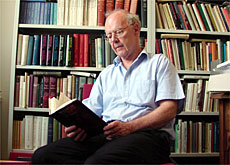Author of verse was not Bard

A new book by a Zurich-based scholar could well be the final word on a long controversy about whether Shakespeare wrote a certain poem.
At the centre of the controversy was the method used by an American professor to identify authorship of the poem.
This involved making a computerised database of Shakespearian words – called “Shaxicon” – and then using a computer to recognise authorship based on the frequency of their use.
After analysing the poem in 1995, Professor Donald Foster claimed that he had discovered an unknown work by Shakespeare. He has since admitted that he was wrong.
But now a new book, “Counterfeiting’ Shakespeare: Evidence, Authorship and John Ford’s Funerall Elegye”, to be published this month by Cambridge University Press, provides conclusive evidence that Shakespeare could not have written the 578-line poem.
The refutation is set out in detail by Professor Brian Vickers, director of Renaissance Studies at the Swiss Federal Institute of Technology.
“When I first read the poem I was completely stunned,” Professor Vickers told swissinfo, “because there wasn’t a single line in it that remotely reminded me of Shakespeare.
Repetitive and unimaginative
“It was written in an extraordinarily repetitive and unimaginative language with an extraordinarily flat and monotonous verse style. Whatever you think about Shakespeare, his language was never dull and his verse was never monotonous.”
Professor Vickers says the claim demonstrates the limits to computer programme’s abilities to analyse texts.
“There’s no doubt in my mind that with extremely powerful computer databases and programmes we can come up with far more thorough and accurate results than before. But it all depends on the hypothesis with which one begins. If that’s wrong, no how many texts are collated, you’re not going to come up with a reasonable answer.”
The Zurich scholar said Dr Foster should have pursued a series of parallel checks on authors other than Shakespeare. “The database used for this comparison was a collection of elegies published between 1612 and 1613 totalling only 80,000 lines.”
Professor Vickers added that by modern standards this was extremely small, bearing in mind that you can now access on line the whole of English Renaissance drama and most of the poetry. “So you’ve millions of lines to work from. The database used was too small in extent and too limited in dates.
Style of John Ford
“For some reason he only chose poems published immediately before this elegy came out in 1612. Had he gone back, say ten years, with a wider series of texts to compare I think he would soon have noticed that the poem was unmistakably in the style of John Ford.”
Another important factor which Professor Vickers mentions in his book is that the American scholar had jumped to the wrong conclusion because the poem bore the initials “W.S.”.
“Now we know for a fact that many works of literature were published in the Renaissance period with false initials on them.
“Sometimes this was for good reasons, for example when persecuted Catholics didn’t dare to sign works with their own name. At other times we know that booksellers were cashing in on the fame of other writers, as in this case probably with Shakespeare.”
Shakespeare as co-author
Professor Vickers has a second book coming out this year entitled “Shakespeare, Co-Author” (Oxford University Press) which is a historical study of works written by Shakespeare in collaboration with other dramatists.
Shakespeare may have co-written some works, but the Zurich-based scholar says he’s in no doubt about the dramatist’s authorship of nearly all of the plays attributed to him.
Returning to the subject of works wrongly attributed to Shakespeare, he says: “The enormous attraction of such claims is that if we were to discover a new piece by Shakespeare it would be similar to finding a new quartet by Mozart or a new unknown painting by da Vinci.
“Any such claim instantly arouses enormous media interest, as it does to a lesser extent when such claims are disproved. The fact that I’m doing this interview with swissinfo is a sign that media interest certainly continues.”
by Richard Dawson
An excerpt from the poem:
Since Time, and his predestined end,
Abridg’d the circuit of his hopeful days,
Whiles both his Youth and Virtue did intend
The good endeavors of deserving praise,
What memorable monument can last
Whereon to build his never-blemish’d name
But his own worth, wherein his life was grac’d –
Sith as [that] ever he maintain’d the same?
A Zurich-based scholar says he has conclusive proof that a poem once thought to have been written by Shakespeare is definitely not the work of the Bard.
In a new book, Professor Brian Vickers, Chair of English Literature at the Federal Institute of Technology in Zurich, sets out to show how computer analysis used to authenticate the work was fundamentally flawed.

In compliance with the JTI standards
More: SWI swissinfo.ch certified by the Journalism Trust Initiative
You can find an overview of ongoing debates with our journalists here . Please join us!
If you want to start a conversation about a topic raised in this article or want to report factual errors, email us at english@swissinfo.ch.